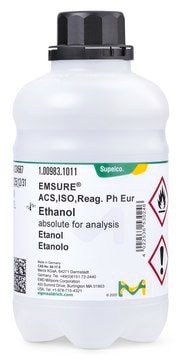E7023
Ethyl alcohol, Pure
≥99.45%, for molecular biology, 200 proof, suitable for RNA extraction and DNA extraction
Synonym(s):
Ethanol, absolute alcohol, non-denatured ethanol
About This Item
Recommended Products
product name
Ethyl alcohol, Pure, 200 proof, for molecular biology
grade
for molecular biology
Quality Level
vapor density
1.59 (vs air)
Assay
≥99.45%
form
liquid
expl. lim.
3.1-27.7 %
greener alternative product characteristics
Safer Solvents and Auxiliaries
Use of Renewable Feedstocks
Learn more about the Principles of Green Chemistry.
sustainability
Greener Alternative Product
concentration
200 proof
technique(s)
DNA extraction: suitable
RNA extraction: suitable
impurities
≤0.2% (water)
pH
7.0 (20 °C, 10 g/L)
bp
78.3 °C
mp
-114 °C
density
0.789 g/mL at 20 °C
application(s)
agriculture
greener alternative category
InChI
1S/C2H6O/c1-2-3/h3H,2H2,1H3
InChI key
LFQSCWFLJHTTHZ-UHFFFAOYSA-N
Gene Information
human ... GABRA1(2554) , GLRA1(2741) , GLRA2(2742)
Looking for similar products? Visit Product Comparison Guide
General description
Application
- DNA and RNA extraction
- array hybridization
- ethanol sedation assay
Biochem/physiol Actions
Other Notes
Signal Word
Danger
Hazard Statements
Precautionary Statements
Hazard Classifications
Eye Irrit. 2 - Flam. Liq. 2
Storage Class Code
3 - Flammable liquids
WGK
WGK 1
Flash Point(F)
55.4 °F - closed cup
Flash Point(C)
13 °C - closed cup
Certificates of Analysis (COA)
Search for Certificates of Analysis (COA) by entering the products Lot/Batch Number. Lot and Batch Numbers can be found on a product’s label following the words ‘Lot’ or ‘Batch’.
Already Own This Product?
Find documentation for the products that you have recently purchased in the Document Library.
Customers Also Viewed
Protocols
Whole genome amplification (WGA) of plasma and serum DNA presents a unique challenge due to the small amount of nucleic acid in such samples.
election of Poly(A)+ RNA by Oligo(dT)-Cellulose Chromatography
Ethidium Bromide Removal
GenomePlex® Whole Genome Amplification has been used to amplify genomic DNA from soybean, corn, tomato, purple coneflower, and ginseng.
Related Content
Three-dimensional (3D) printing of biological tissue is rapidly becoming an integral part of tissue engineering.
Our team of scientists has experience in all areas of research including Life Science, Material Science, Chemical Synthesis, Chromatography, Analytical and many others.
Contact Technical Service




